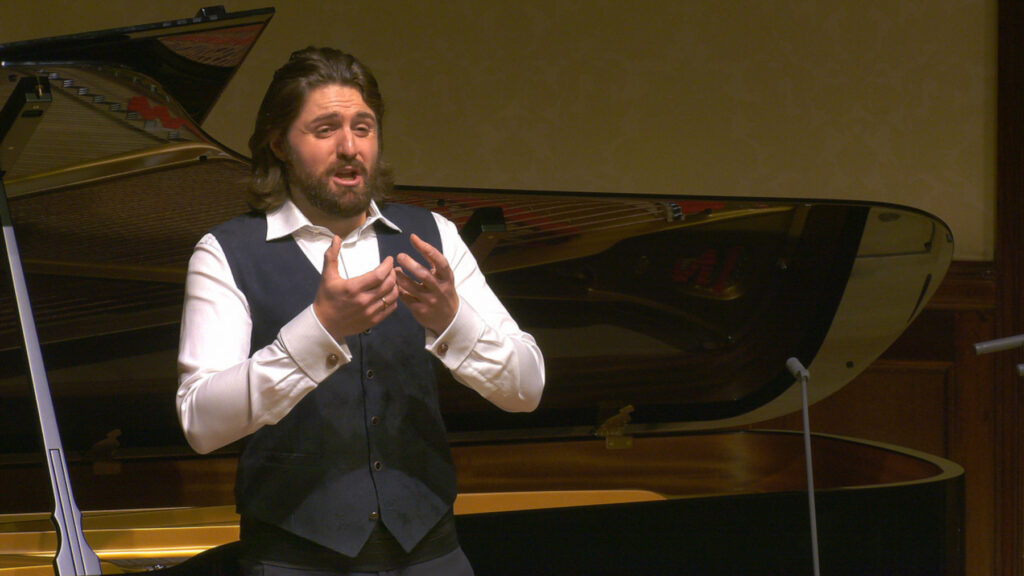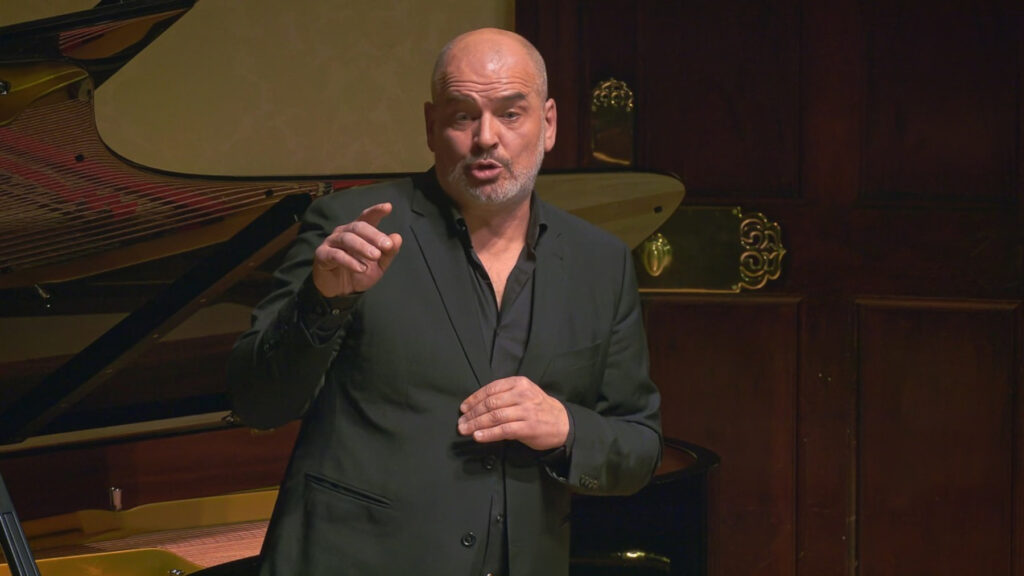Wigmore Hall gave London audiences the opportunity to hear lieder recitals by two leading German-speaking baritones within the space of a weekend. Konstantin Krimmel was joined by pianist Ammiel Bushakevitz for a programme of Schubert and Loewe, and Florian Boesch, partnered by Malcolm Martineau, performed Ernst Krenek’s Reisebuch aus den österreichischen Alpen. Krimmel’s recital marked Schubert’s 228th birthday, while Krenek’s cycle was completed in 1929, 101 years after Schubert’s death.
Krimmel, in his early 30s, is a former BBC New Generation Artist and a member of the company at the Bavarian State Opera, while Boesch, some 20 years his senior and firmly established as a major interpreter of lieder, has also sung operatic roles such as Wozzeck and Count Almaviva. Since 2015 he has been Professor of Lied and Oratorio at the University of Music and Performing Arts in Vienna.

If Krimmel and Bushakevitz were celebrating Schubert’s birthday, the programme was often sombre in mood, as if to remind us that the composer never got beyond the age of 31. It opened with ‘Der Wanderer’, both questing and questioning, and ended with the hair-raising ‘Erlkönig’, having also included the setting by Loewe of Goethe’s desperate, haunted nightride. Loewe’s danse macabre ‘Der Totentanz’ brought the first half of the recital to a frenetic close, but life was defiantly reaffirmed after the interval with Schubert’s ‘Prometheus’. There were episodes of unalloyed (though fleetingly bittersweet) lyricism too, in the hesitant optimism of ‘Hoffnung’ and the gentle yearning of ‘Der Jüngling an der Quelle’, while the second of the two encores, ‘Über allen Gipfeln ist Ruh’’ (Wandrers Nachtlied II), offered serene reassurance.
Through every shift of mood, whether subtle or emphatic, and at every dynamic from a whisper to a commanding fortissimo, Krimmel sang and enunciated with compelling immediacy. At the same time he performed with a treasurable lack of contrivance: for all his responsiveness to musical and textual nuance, he is not one of those lieder singers who seems to be saying: “Please take note of the tone colour I am applying to this particular syllable.” It helps too that his voice ‘speaks’ so consistently, always firm, with an almost tenorial luminosity in the upper register and impressively dark resonances further down – notably in the final bars of ‘Auf der Donau’, as the poet imagines sinking beneath the waves.
Krimmel’s collaboration with Bushakevitz was in the best sense seamless and the pianist especially relished the opportunities offered him in the set of songs by Carl Loewe. Though the North-German composer (born in 1796) outlived Schubert by more than 40 years, four of the five selections dated from the first 20 years of the 19th century. It is puzzling that Loewe’s songs do not occupy a more central position in today’s lieder repertoire. Maybe more ‘operatic’ and less harmonically and stylistically distinctive than Schubert’s, they are imaginative, vivid and engaging. (Though it did not feature in the recital, for claustrophobic Gothic horror there is nothing like Loewe’s ‘Edward’, based on a Scottish ballad.) While Schubert’s ‘Erlkönig’ is a headlong, nightmarish gallop, Loewe’s perhaps more conventional treatment – a kind of miniature dramatic scena –affords greater space for characterisation and atmospheric keyboard sonorities.

Krenek’s Reisebuch aus den österreichischen Alpen, written when the composer was not yet 30, deserves to be heard more frequently too. That being said, not every singer could offer the authentic accent and inimitably Viennese blend of Gemütlichkeit and wry sardonicism that Florian Boesch brought to the cycle of 20 songs. Running to less than an hour in total, it constitutes a much less draining journey than Winterreise, although, as the composer wrote: “The idea of a journey has, since Schubert’s great song-cycles, always appeared to me a particularly suitable subject for a cycle … The spirit of Schubert dominates the work in many compositional details …”
With his velvety, subtly vibrant baritone, confiding ease of vocal manner and spontaneity of physical gesture, Boesch could have been recalling his Alpine holiday at a corner table in a Beisl rather than on the stage of a revered concert hall. This is not to suggest that the observations made by Krenek in his concise texts for the songs are consistently glowing or cosy. At times these songs are postcards from the edge. The narrator’s eye is lightly philosophical, sometimes jaundiced, and sometimes prescient. The spiky ‘Auf und ab’ bemoans the pressures of mass tourism; when reflecting on an Alpine monastery he observes that its inhabitants “are not slaves to technology like we are,” and the most resonant lines in the declamatory ‘Politik’, coloured by the trauma of World War One, warn that there could be worse to come if people fail to come to their senses. (In 1938, shortly after the Anschluss, Krenek – whose cross-cultural 1927 operatic hit Jonny spielt auf was deemed ‘degenerate’ by the Nazis – left Europe for America.) There is, though, room for humour, optimism and – in a lilting, dancing song explicitly dedicated to the memory of Franz Schubert – a paean to the joys of Austrian wine.
Krenek’s musical style in the cycle is eclectic – ranging from beguiling Straussian intimacy to touches of Gershwinian jazziness and dense contrapuntal knitting in the vein of Hindemith. It is very much in the spirit of the 1920s, sometimes irreverent, frequently angular, but never merely refractory. Malcom Martineau, absolutely part of the masterly show with Boesch, gave a brilliant rendition of the kaleidoscopic piano writing. Over the course of the cycle there really was never a dull moment.
Yehuda Shapiro
Schubert Birthday Concert
Songs by Franz Schubert and Carl Loewe
Konstantin Krimmel (baritone), Ammiel Bushakevitz (piano)
Wigmore Hall, London, 31 January 2025
A video of this recital can be viewed free of charge on Wigmore Hall’s website:
https://www.wigmore-hall.org.uk/whats-on/202501311930
Ernst Krenek – Reisebuch aus den österreichischen Alpen.
Florian Boesch (baritone), Malcolm Martineau (piano)
Wigmore Hall, London, 2 February 2025
Top image: Konstantin Krimmel and Ammiel Bushakevitz